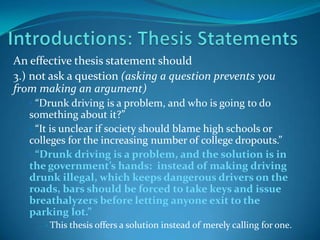ENG 101 Research Paper: Writing Introductions and Thesis Statements
- 1. • • A good introduction should do the following: 1.) Identify your topic. 2.) Offer background information on your topic (explain context of “they say”). 3.) Stress the importance of the topic. 4.) Anticipate the counterargument. 5.) State your main point (thesis). Objectively explain both sides of the issue before stating your claim.
- 2. An effective thesis statement should 1.) Make an argument • Without an argument, you have no thesis. • “Technology has made numerous advances since the Middle Ages” This is not an argument; who would disagree with you? (Some might argue that the advances weren’t good for society, but they wouldn’t be disagreeing with you.) • • A better thesis would be, “The technological advances since the Middle Ages, though helpful, have weakened our society; now, nobody knows how to survive without the help of a computer.” Assuming you can back this up with evidence, you have made an argument—many claim technological advances are helpful, and you are claiming the opposite. You’ve even offered a reason! •
- 3. An effective thesis statement should 2.) Be specific. • “Technological advances seem good but have actually made society worse” isn’t specific. •Avoid vague terms like “seem” and “might.” Also, what advances? What is worse? • “Technological advances have improved life but removed all privacy: cell phones now come standard with friend locators, so a person can no longer hide; and computers record personal data that can be retrieved online, leaving everyone’s information subjected to any person with an internet connection.” You have now focused specifically on cell phone locators and identity on the Internet. • When constructing a thesis statement, consider the length of your essay; don’t take on more than you have room to discuss. For a twopage paper, cell phones and computer records might be too much to discuss in detail; for a ten-page paper, you might need more. •
- 4. An effective thesis statement should 3.) not ask a question (asking a question prevents you from making an argument) • “Drunk driving is a problem, and who is going to do something about it?” • “It is unclear if society should blame high schools or colleges for the increasing number of college dropouts.” • “Drunk driving is a problem, and the solution is in the government’s hands: instead of making driving drunk illegal, which keeps dangerous drivers on the roads, bars should be forced to take keys and issue breathalyzers before letting anyone exit to the parking lot.” • This thesis offers a solution instead of merely calling for one.
- 5. An effective thesis statement should 4.) avoid first-person; not be self-aware • “This essay will discuss the pros and cons of the new bill.” • “I think that the new bill will improve the city.” • “The new bill, which lowers residential taxes, will not improve the city unless citizens are willing to volunteer for city beautification projects, which is unlikely.” The rest of the essay for this thesis statement will prove why citizens are unlikely to volunteer and why the bill will affect beautification. • Even if your thesis is an opinion (as it often is), state is as a fact. (Your body paragraphs should offer enough support to make it appear as a fact.) •
- 6. An effective thesis statement should 5.) anticipate the counterargument (best place for it in intro) •A counterargument offers the other side of the argument and refutes it. Your thesis should anticipate this body paragraph. • A good way to do this is to word your thesis with an “although” or “though” clause: “Although the mayor claims the new bill, which lowers residential taxes, will improve the city, the budget will be shifted considerably and will leave no money for city beautification projects.” •
- 7. An effective thesis statement should 6.) change and shift throughout your drafts • Your first “working” thesis statement will rarely, if ever, end up as the thesis statement you use in your final essay. As you research, your own opinion about the topic might change, or you might find information that leads you to different support than you originally planned. • Never be scared to change your thesis statement. In fact, your thesis should be the final thing you proofread/revise before turning in your essay. Remember, your thesis is arguably the most important sentence in your entire essay. Proofread/revise it regularly as you draft. •







